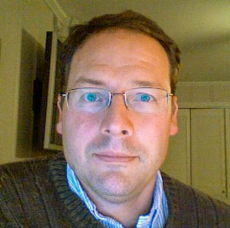Nugent to Illuminate Astrophysics at NERSC in Upcoming Seminar
August 21, 2024
By Elizabeth Ball
Contact: cscomms@lbl.gov

Peter Nugent is the division deputy for Scientific Engagement in Berkeley Lab’s Applied Math and Computational Research Division.
Transient events in space – astronomical phenomena lasting anywhere from milliseconds to months or years – provide a window into the history and the present state of our universe, and for decades, systems at the National Energy Research Scientific Computing Center (NERSC) have supported research on these events. To celebrate that long history of discovery, Berkeley Lab Senior Scientist Peter Nugent will give his talk “A Quarter Century of Transient Science and Its Impact on Cosmology at NERSC,” part of the NERSC@50 seminar series. Join via Zoom on August 26 at 1:30 p.m. PDT.
For 25 years, NERSC has played a pivotal role in the discovery of astrophysical transients as well as understanding the physics behind them, and it’s well positioned to continue for many years to come. Nugent will highlight some key discoveries supported by NERSC, what researchers have learned about them, and how they have informed our current understanding of the cosmological parameters. He’ll also look to the future and discuss how the field is changing and the role NERSC will play moving forward.
Peter Nugent is a senior scientist at Berkeley Lab and is currently the division deputy for scientific engagement in Berkeley Lab’s Applied Math and Computational Research Division. His research focuses on the use of high performance computing to tackle problems spanning observational data analysis and theoretical simulation in cosmology and astrophysics and, more recently, in epidemiology.
About NERSC and Berkeley Lab
The National Energy Research Scientific Computing Center (NERSC) is a U.S. Department of Energy Office of Science User Facility that serves as the primary high performance computing center for scientific research sponsored by the Office of Science. Located at Lawrence Berkeley National Laboratory, NERSC serves almost 10,000 scientists at national laboratories and universities researching a wide range of problems in climate, fusion energy, materials science, physics, chemistry, computational biology, and other disciplines. Berkeley Lab is a DOE national laboratory located in Berkeley, California. It conducts unclassified scientific research and is managed by the University of California for the U.S. Department of Energy. »Learn more about computing sciences at Berkeley Lab.







